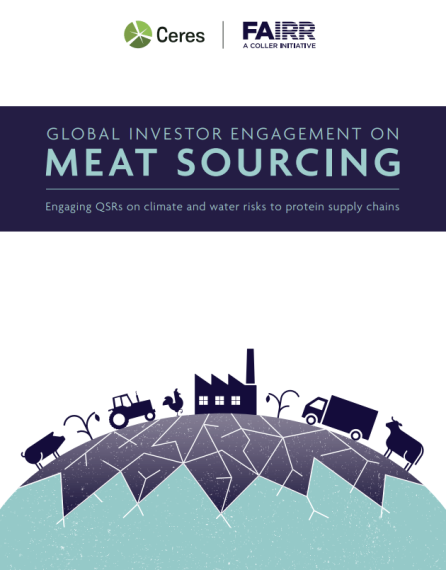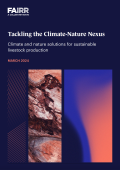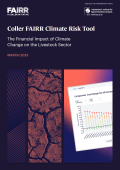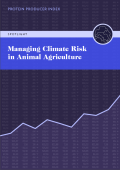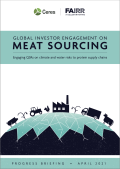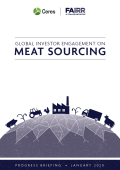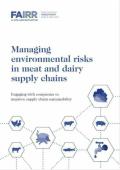Executive Summary
Since the start of this engagement in 2019, institutional investors have steadily increased pressure on quick-service restaurants to address climate and water risks in their animal protein supply chains. Despite mounting scientific evidence of companies’ vulnerability to water stress and climate risk, the global production of meat and dairy continues to expand. With new guidance on reporting and risk management, companies must remain accountable for the commitments they have made to protect the sustainability of their agricultural supply chains.
In 2021 and into 2022, we saw an expansion of investor attention on climate risk disclosure through membership in climate-related task forces, and strengthened regulatory disclosure requirements from governments, including the United States. Further, new academic evidence highlights the severity of the water crisis and how companies and investors can be a greater part of addressing the urgency of global water risk from animal agricultural production.
Scientific research shows that animal agriculture remains highly vulnerable to climate change. The Intergovernmental Panel on Climate Change (IPCC) released its Sixth Assessment Report earlier this year detailing key impacts of climate change on ecosystems. At global warming levels of 2°C, freshwater availability, soil quality, and pollinator health are all at risk of continual depletion. The livestock industry’s reliance on pastures and feed makes it vulnerable to these impacts. Warming may increase operational costs and interrupt supply chains for those quick-service restaurants not addressing risk to their animal protein production, especially if these restaurants continue to see increasing store locations and procurement volume. Ranchers in North America and Australia have already been forced to reduce herd sizes in response to major droughts.
The livestock industry remains a focus area for research on agricultural impacts on climate and water. Livestock production is the main agricultural emissions source, and intensifying production continues to degrade natural ecosystems. A report released in April by Ceres and the Global Institute of Water Security at the University of Saskatchewan assessed the scientific evidence from the 1950s to the present day and identified the food sector, and livestock production in particular, as a leading driver of water depletion and degradation. The future stability of livestock production and consumption relies on improved practices within the supply chain to conserve water and reduce environmental harm.
Investors are responding to the growing scientific evidence of the impact of animal agriculture on water and climate risks by asking for expanded disclosure in meat supply chains. Institutional investors are focusing on new areas of water and climate risk mitigation and requesting more thorough reporting from companies. The Taskforce on Nature-related Financial Disclosures and Biodiversity Finance Initiative are recent additions to the growing landscape of finance-related climate initiatives encouraging deeper consideration of climate and water risks in the capital markets.
The consensus around the need for more focus on reducing emissions and managing climate risk in agriculture, forestry, and other land use (AFOLU) sectors has strengthened in the past year. At the 2021 UN Climate Summit (COP26), 137 countries committed to ending forest loss and land degradation by 2030 in the Glasgow Leaders’ Declaration of Forests and Land Use. Country leaders emphasised the critical role of forests, biodiversity, and land use in enabling the world to adapt to climate change and meet the Paris Agreement goals. The declaration was followed by various pledges to address deforestation tied to agricultural commodities, including commitments from financial institutions, but also global agricultural commodity companies with major market share in soy, palm oil, cocoa, and cattle.
When it comes to climate, disclosure requirements are strengthening as governments around the world expand the scope and strength of climate commitments and reporting guidelines. The United Nations Race to Zero campaign and the SBTi Business Ambition for 1.5°C campaign exemplify how government, company, and investor efforts are strengthening their commitment to ambitious emissions reductions and, ultimately, net zero. Further, in 2021 and 2022, the European Union and the United States’ Securities and Exchange Commission (SEC) proposed new mandatory reporting rules for publicly traded companies to disclose material climate-related risk. These proposals could improve corporate transparency to investors and require companies to examine their response to climate risks.
Pressure to address the global water crisis is increasing. As the world faces an existential and multi-faceted threat to our global freshwater resources, the global community is responding. The United Nations is convening an international Water Conference in 2023 as a “midterm comprehensive review of the implementation of the International Decade for Action, ‘Water for Sustainable Development’, 2018-2028”. Under the auspices of the UN High Level Panel on Water, Ceres and the Government of the Netherlands partnered to launch the Valuing Water Finance Task Force to drive corporate action on water-related financial risks. The financial and scientific imperative for corporate water stewardship has never been stronger and investors are engaging companies with increasing sophistication.
Written by

Senior Manager, Research & Engagements


